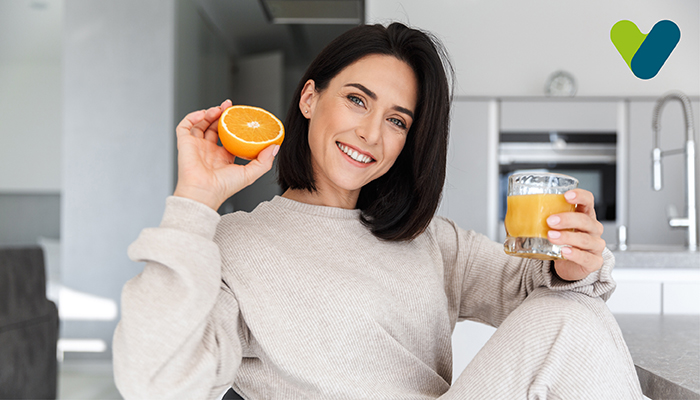The importance and vitality of nutrients and vitamins are taught to us from early childhood. Every human requires the almost same set of vitamins but the intake amount may differ depending upon an individual’s age and sex. Women are completely different from the other sex and their body requirements of nutrients, proteins and vitamins are, therefore, quite diverse. In our fast-paced lives, many times we are unable to pay heed to the importance of a balanced diet, especially in the early years of life which may show negative impacts later on.
Women are entitled to have special and extra treatment because there is a very long list of things that a woman does and goes through in a day. So, to maintain the health and fitness of your body, it is very important to keep a tab on what daily vitamins the body is taking/ consuming. Women under the age of 30 are believed to be the most healthy. But as time passes and you reach your 30s, taking your self-care seriously becomes all the more essential. The body starts to lose certain vitamins and this is the time you need to manage your diet. Here is a list of some of the best multivitamins for women that must not be neglected in the daily diet:1. Vitamin C
Everyone wants healthy and glowing skin but not everyone takes the required steps in this direction. Do not let yourself stand disappointed in front of the mirror, take the needed steps to help out your skin. Vitamin C is a strong antioxidant that every woman must include in her daily diet. Not just this, vitamin C helps in the production of collagen that keeps your skin healthy and young. These vitamins are also highly suggested for a strong immune system, especially in women.
Vitamin C Foods that can help: Citrus fruit, peppers, strawberries, blackcurrant, broccoli, and potatoes are some of the popular food items that include a high amount of vitamin C.
2. Vitamin E As discussed earlier, a person’s needs for nutrition keep varying as per her age and her health. Another powerful antioxidant, it protects the cells in your body from oxidative stress. To function normally it is vital that your body receives the required amounts of Vitamin E on a regular basis.
Vitamin E Foods that can help: Avocados, sunflower seeds, almonds, peanuts are good sources of vitamin E.
3. Vitamin D and Calcium
When talking about vitamins for health, Vitamin D is highly recommended for women along with calcium. Women are quite likely to lose calcium after their 30s which makes their bones weak. Vitamin D works with calcium and helps absorb it in the body which ultimately keeps your bones healthy. It also keeps your immune system healthy and functional. Another amazing thing about Vitamin D is it helps in weight loss and also keeps your heart healthy.
Things that can help: A very easy source of vitamin D is sunlight. However, other foods rich in Vitamin D include cod liver oil, fortified food items, mushrooms, and fatty acids.
4. Folic acid
Folic acid, also known as folate or vitamin B9, is advised for the growth and production of cells. As women in their 30s are mostly in their childbearing years, folic acid can help maintain your health and prepare you for a healthy pregnancy. Folic acid keeps you in a good mood and also enhances your memory power. Not just this, it also helps in your verbal fluency and the overall health of your body. Folic acid tablets and other supplements are offered by various brands. They are easily available as OTC medicines.
5. Iron
Vitamins for a healthy life are important, and along with this, iron also plays a key role. Both low and excess intake of iron is harmful to women’s bodies. While excessive intake can lead to stomach pain, vomiting, and anaemia, low intake can cause heavy menstrual flow. As meats are a rich source of iron, those women who do not eat meat are more likely to suffer a deficiency of iron. It is needed for even pregnant women to have a proper intake of iron to maintain the health of both the baby and the mother. Without ample iron consumption, you may feel tired, restless and may become prone to infections. Foods that can help: For vegetarians, spinach, beans, chickpeas, lentils, broccoli, peas etc. are a great source of iron. However, if you are a non-vegetarian, you can get iron from red meat, turkey and fish are also healthy options.
6. Vitamin B supplements
When talking of essential vitamins for women, it is important to count the value of vitamin B supplements that are easily available. It helps you keep your mood relaxed, happy and your body healthy. As women mostly have a tiring schedule, be it a housewife or a working one, they must provide their body with the right vitamin B supplements to reduce everyday anxiety. Therefore daily vitamins for women are important.
Merely knowing about the important nutrients, vitamins and minerals would not be enough. Before deciding what’s right and fit for your consumption, you must consult your doctor or nutritionist. They can better guide you to what is most suitable for you. Especially for pregnant women, it is always safe to consult her gynaecologist before bringing any change in her diet.
Now that you know about all the benefits these vitamins provide to your body, do not have a second thought and make the necessary changes in your lifestyle as well as diet. From keeping your bones and skin healthy to maintaining your immune system and health, these vitamins help in all these tasks. The 30s is a major turning point and you must give yourself the amount of care and attention you need.
So, are you ready to bring this positive change to your life?
